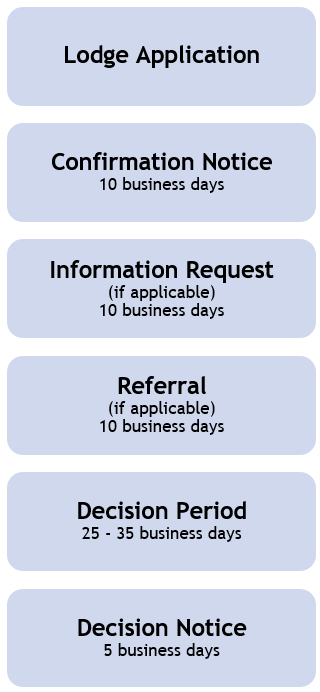Learn about the necessary steps and considerations when seeking a change in the use of your property.
Under the Planning Act 2016, a Material change of use (MCU), of premises means:
If your development constitutes a material change of use, a development permit may be required from Council. If you are unsure if the development constitutes a material change of use, please confirm with Council.
You can use the Townsville City Plan to determine if your MCU development requires a development permit to operate. Firstly, you must determine the defined use of your development by reviewing the use definitions in Schedule 1. Once the defined use is determined, visit the Tables of Assessment in Part 5, which determines the level of assessment for the use within a particular zone. If the site is subject to an overlay you will also need to confirm if the overlay elevates the level of assessment.
In practice there are typically four levels of assessment, as follows:
When lodging your application, the following materials must be included to achieve a ‘properly made’ application and enable the assessment process to start:
Depending on the nature of the application, technical reports may also be required for Council’s assessment of the application (e.g., traffic, flood, stormwater, noise etc).
A well-prepared application is likely to proceed through the assessment process faster.
An application can be submitted to Council by one of the following methods:
An assessment fee is required for each development application lodged with Council. To find the fees associated with a Material change of use application for a particular use, please refer to Council's Fees and Charges schedule.
The Planning Act 2016 and related material establishes the assessment timeframes which vary by assessment level. The below illustration demonstrates the legislative timeline for a Code Assessable application requiring referral.
For Impact Assessable applications add 15 business days for public notification and up to 10 business days for Council to consider submissions. Generally, timeframes can be extended by mutual agreement.

Council levies infrastructure charges for development which generates additional demand upon trunk infrastructure networks.
For more information, please read Council’s infrastructure charges page or contact Council for a fee-free infrastructure charge estimate before engaging in any development activity.
Once a development permit for a material change of use is obtained (approval issued), additional permits may be required, such as:
Please note: there may be additional approvals required beyond the permits listed above.
During the development assessment process, some applications also require a concurrent assessment by referral agencies. Referrals are commonly required for properties that, due to their location, may potentially impact State controlled or private entity infrastructure. A common example is a State-controlled Road. The applicant is responsible for ensuring their application is referred to all applicable referral agencies.
View the most commonly asked questions about a material change of use.
Typically, a development permit, for a Material change of use remains valid for 6 years from the date the approval takes effect. This means that the use must commence before this currency period ends. Before a development permit lapses, you can apply to Council to extend the currency period.
Yes, this is encouraged. To streamline the development assessment process and improve development outcomes, we recommend discussing your proposal with Council before lodging your application. Use our online booking form to arrange a free pre-lodgement meeting with Council.
A Code Assessable application is required for uses that align with the property’s zoned intent and is assessed against the applicable codes from the Townsville City Plan.
An impact assessable application is required for uses that are not aligned with the property's zoned intent and are assessed against the whole of the Townsville City Plan, which includes the strategic intent.
During the 15-business day public notification period, members of the public can make a submission about the proposed development. Council is required to review all properly made submissions and consider all valid planning grounds raised.
Public notification is mandatory for Impact Assessable development applications. The notification process must last at least 15 business days and includes:
The applicant must notify Council of when they intend to commence the public notification and also notify Council again when it has been completed. Council will consider any submissions received during the public notification period as part of its assessment.
Subject to approval, after receiving the approval notice and following the end of the appeal period (usually 20 business days), you must satisfy the conditions of the development permit. This may include getting further approvals from Council, works onsite, or obtaining a compliance assessment approval. You will also need to pay any infrastructure charges that may be applicable.
Yes. If an approval for an existing use on the site already exists, you may request alterations to the development. Depending on the scale of the changes, the approval can be achieved either through a ‘Minor change’, or an ‘Other change’ application process.